Once Upon Time Two Empires
By Dr. Şenol Kantarcı*
Turkish-US relations started when official channels were established between Istanbul and Washington in the 19th century, which is known as the longest century of the empire.
Turkish-US relations started when official channels were established between Istanbul and Washington in the 19th century, which is known as the longest century of the empire.
The first step in the bilateral relations were taken by the US. Washington’s desire to become more effective in Mediterranean trade, and the strategic location of Turkey (for the USA), similar to the situation today, necessitated the establishment of relations in the beginning of the 1800s.
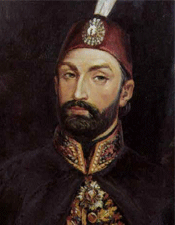
The position of the USA, which strove for over 30 years at the beginning of the 19th century to sign a trade agreement with the Ottoman Empire, can be seen as equivalent to the situation of Turkey waiting in front of the gates of the European Union (EU).
PAYING TAXES TO OTTOMAN PROVINCES
After declaring independence in 1776, American trade ships sailed the oceans. Giving importance to the overseas trade, Americans, calculating the profits, oriented themselves towards the Mediterranean. But in those days, without reaching an agreement with the North African Principalities (Barbary Coast), a secure trade in the Mediterranean was not possible.
Americans had established similar relations with nations with strong navies such as England, France, and Spain. To be able to move and to secure its trade ships in the Mediterranean, France was paying Algiers 200,000 Spanish doubloons per year. This amount for England was set at 280,000 Spanish doubloons per year.
At first the Americans were able to sail under the English flag and were able to move freely in the Mediterranean. But, after acquiring independence after the Revolutionary war, American ships were not able to fly English flags, and this turned out to be a new opportunity for gain for the Algerian, Moroccan, and Tripoli pirates.
Morocco, Tunisia, Algiers and Tripoli would considered anybody who didn’t sign a peace treaty with them as enemies and would attack the ships of such countries for booty.
CAPTURED AMERICANS
Algerian pirates not only attacked American ships, but they also would imprison Americans on these ships. This situation caused concerns in the American public. In 1785 Algerian pirates captured two ships named Maria and Dolphin and 21 American sailors.
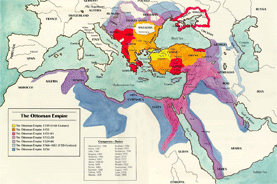
The American government tried to reach a treaty with the ruler of Algiers, but could not reach an agreement when the Dey of Algiers asked for a ransom of 3,000 American dollars for each American sailor.
In 1793 Algerian pirates came with 10 American trade ships and 105 Americans captured in the Atlantic Ocean. The Algerians received a ransom of 2,274,000 Mexican pesos for the prisoners from the USA. In addition, the USA agreed to pay an annual sum of $12,000 in Algerian gold to the Algerians.
Tripoli requested 30,000 dollars from the USA. In 1803 the Tripoli pirates captured a battle ship named Philadelphia and were brought her to the harbor of Tripoli. The Dey of Tripoli Yusuf Pasha requested a ransom of more than 3,000,000 dollars for 307 American sailors.
The American public demanded precautionary measures against these occurrences that had started to become a major problem and the US government made agreements to pay the Ottoman Provinces a tribute of a certain amount of cash as well as gifts.
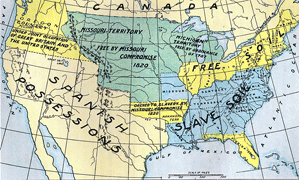
THEY WAITED 30 YEARS TO APPOINT AN AMBASSADOR
The Ottoman Empire was reluctant to establish official relations with the USA. Although Washington appointed an American, William Stewart, as consul to Izmir, this was not recognized by the Sublime Porte. After studying the situation and writing reports on how to improve trade between the Ottoman Empire and the US, Mr. Stewart left Izmir.
In 1808 the US made another attempt. Although intending to appoint a Mr. Sloan as consul to Izmir, this again failed at the Sublime Porte. After lengthy attempts at negotiations by Washington with the Sublime Porte, in 1811 the first American business enterprise, Woodmans & Offley, was established in Izmir.
Washington sent M.J. Jaussand, a representative of a Baltimore based company, to Istanbul to contact Ottoman officials. In order to sign a trade agreement Jaussand met with some prominent Ottoman officials at the French Embassy in Istanbul, but interestingly he was advised to establish secret contacts directly with the Ottoman Empire. Although Jaussand reported the situation to the Secretary of State John Quincy Adams, no result was achieved.
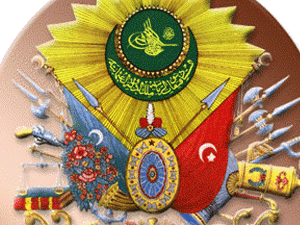
In 1824 the American government appointed David Offley, the founder of the first American company in Izmir, as the US Consul to Izmir, and this was accepted by the Sublime Porte.
OFFICIAL CONTACTS
Official talks between Istanbul and Washington could only start in 1820. US Secretary of State Adams sent Luther Bradish, a lawyer from New York with dual citizenship, with the purpose of collecting information secretly. In a letter dated January 20, 1820 Bradish informed the State Department that after a meeting with the Foreign Minister in Istanbul he realized that the reason he was sent for was understood by the officials.
He informed his government that the instructions he was given were invalid, and added that an agreement as planned would cost about 50 thousand dollars. In the same year, the Commander of the US fleet, William Bainbridge, was assigned to establish official trade relations. But this attempt also did not bring any results.
This time Secretary of State Adams sent another person to negotiate with the Admiral of the Turkish Fleet Husrev Pasha. During the meeting Husrev Pasha let this person know that the commander of the American fleet should contact him in secret in December of the same year, that he would bring the agreement to the Sultan himself, and that the Sultan would decide if an American delegate should come to Istanbul to start negotiations with the Ottoman government.
The person Adams would appoint was Offley. In a letter dated December 27th, 1824 Offley discussed the benefit of such an agreement to the US and advised the American government to establish secret contacts with the Sublime Porte.
THE POWER OF THE LOBBY
During the 1820s Turkish-American trade was very attractive to the American businessmen; they supported the Ottomans against the rebelling Greeks, who were aiming for independence.
Henry Clay, representing Kentucky in the U.S. House of Representatives (he was appointed Secretary of State after John Quincy Adams) criticized US policies with these words: “A wretched invoice of figs and opium has been spread before us to repress our sensibilities and eradicate our humanity…”
This was so effective that the Monroe government refrained from recognizing Greek independence in favor of the Turkish-American trade.
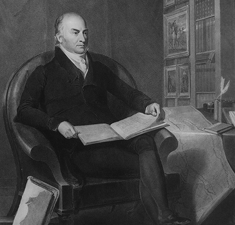
After 30 years of struggle of the US government to reach an agreement, on May 7th, 1830 a friendship and trade agreement was signed between the two countries.
EXTRAORDINARY ATTENTION TO MAJOR EMIN EFENDI
In 1850, following an official invitation, Emin Efendi, who was a professor at the Naval Academy holding the rank of Engineer Major, visited the US to establish military and technical contacts. In every state he visited, he was greeted not as an officer but as a high level official.
In every city he visited official receptions were held in honor of Emin Efendi. In Washington a band played in front of the house allocated for his use. The city was ornamented and at night a torchlight procession, in which the public participated, was organized followed by a firework show.
Major Emin Efendi was also received by the US Congress, and a special appropriation to host the Turkish delegate and announcement of Emin Efendi as the official guest of the US was accepted by the Congress. The President, Millard Fillmore gave a reception in his honor, in which all the government was present. Laudatory speeches were made for the Ottoman Sultan Abdulmecid and Turkish officials.
This extraordinary attention came as a surprise not only to Major Emin Efendi but also to other foreign representatives. Major Emin Efendi would cite this extraordinary interest in the report he sent to Istanbul.
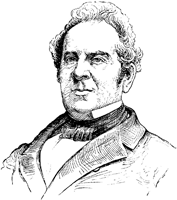
MARBLE INSCRIPTION FOR THE MONUMENT BY ABDULMECIT
In response to the good reception of Emin Efendi by the US government and the American people, in 1852 the Sultan Abdulmecid sent 56 books, including dictionaries, literature, logic, and history books to the recently established “School of Oriental Languages” in Boston.
The US Embassy in Istanbul requested from the Sublime Porte an inscription in marble with a sultan’s signature to be used on the George Washington monument. The marble inscription one endaze (ca. 26 inches) in length and 2 endaze in width was prepared and sent to Washington. The reason for the inscription was written in verse and was dated.
• Dr. Şenol Kantarcı, Dean of the Ataturk’s Principles and History of Turkish Revolution Department at Suleyman Demirel University.
(July 2006, 21th Issue)

In 1852 the Sultan Abdulmecid sent 56 books to the recently established ?School of Oriental Languages in Boston.
The position of the USA, which strove for over 30 years at the beginning of the 19th century to sign a trade agreement with the Ottoman Empire, can be seen as equivalent to the situation of Turkey waiting in front of the gates of the European Union (EU).
PAYING TAXES TO OTTOMAN PROVINCES
After declaring independence in 1776, American trade ships sailed the oceans. Giving importance to the overseas trade, Americans, calculating the profits, oriented themselves towards the Mediterranean. But in those days, without reaching an agreement with the North African Principalities (Barbary Coast), a secure trade in the Mediterranean was not possible.
Americans had established similar relations with nations with strong navies such as England, France, and Spain. To be able to move and to secure its trade ships in the Mediterranean, France was paying Algiers 200,000 Spanish doubloons per year. This amount for England was set at 280,000 Spanish doubloons per year.
At first the Americans were able to sail under the English flag and were able to move freely in the Mediterranean. But, after acquiring independence after the Revolutionary war, American ships were not able to fly English flags, and this turned out to be a new opportunity for gain for the Algerian, Moroccan, and Tripoli pirates.
Morocco, Tunisia, Algiers and Tripoli would considered anybody who didn’t sign a peace treaty with them as enemies and would attack the ships of such countries for booty.
CAPTURED AMERICANS
Algerian pirates not only attacked American ships, but they also would imprison Americans on these ships. This situation caused concerns in the American public. In 1785 Algerian pirates captured two ships named Maria and Dolphin and 21 American sailors.

Ottoman Empire borders (1359-1856) in 19th century.
The American government tried to reach a treaty with the ruler of Algiers, but could not reach an agreement when the Dey of Algiers asked for a ransom of 3,000 American dollars for each American sailor.
In 1793 Algerian pirates came with 10 American trade ships and 105 Americans captured in the Atlantic Ocean. The Algerians received a ransom of 2,274,000 Mexican pesos for the prisoners from the USA. In addition, the USA agreed to pay an annual sum of $12,000 in Algerian gold to the Algerians.
Tripoli requested 30,000 dollars from the USA. In 1803 the Tripoli pirates captured a battle ship named Philadelphia and were brought her to the harbor of Tripoli. The Dey of Tripoli Yusuf Pasha requested a ransom of more than 3,000,000 dollars for 307 American sailors.
The American public demanded precautionary measures against these occurrences that had started to become a major problem and the US government made agreements to pay the Ottoman Provinces a tribute of a certain amount of cash as well as gifts.

Ottoman Empire? borders (1359 ? 1856) in 19th century.
THEY WAITED 30 YEARS TO APPOINT AN AMBASSADOR
The Ottoman Empire was reluctant to establish official relations with the USA. Although Washington appointed an American, William Stewart, as consul to Izmir, this was not recognized by the Sublime Porte. After studying the situation and writing reports on how to improve trade between the Ottoman Empire and the US, Mr. Stewart left Izmir.
In 1808 the US made another attempt. Although intending to appoint a Mr. Sloan as consul to Izmir, this again failed at the Sublime Porte. After lengthy attempts at negotiations by Washington with the Sublime Porte, in 1811 the first American business enterprise, Woodmans & Offley, was established in Izmir.
Washington sent M.J. Jaussand, a representative of a Baltimore based company, to Istanbul to contact Ottoman officials. In order to sign a trade agreement Jaussand met with some prominent Ottoman officials at the French Embassy in Istanbul, but interestingly he was advised to establish secret contacts directly with the Ottoman Empire. Although Jaussand reported the situation to the Secretary of State John Quincy Adams, no result was achieved.

In 1824 the American government appointed David Offley, the founder of the first American company in Izmir, as the US Consul to Izmir, and this was accepted by the Sublime Porte.
OFFICIAL CONTACTS
Official talks between Istanbul and Washington could only start in 1820. US Secretary of State Adams sent Luther Bradish, a lawyer from New York with dual citizenship, with the purpose of collecting information secretly. In a letter dated January 20, 1820 Bradish informed the State Department that after a meeting with the Foreign Minister in Istanbul he realized that the reason he was sent for was understood by the officials.
He informed his government that the instructions he was given were invalid, and added that an agreement as planned would cost about 50 thousand dollars. In the same year, the Commander of the US fleet, William Bainbridge, was assigned to establish official trade relations. But this attempt also did not bring any results.
This time Secretary of State Adams sent another person to negotiate with the Admiral of the Turkish Fleet Husrev Pasha. During the meeting Husrev Pasha let this person know that the commander of the American fleet should contact him in secret in December of the same year, that he would bring the agreement to the Sultan himself, and that the Sultan would decide if an American delegate should come to Istanbul to start negotiations with the Ottoman government.
The person Adams would appoint was Offley. In a letter dated December 27th, 1824 Offley discussed the benefit of such an agreement to the US and advised the American government to establish secret contacts with the Sublime Porte.
THE POWER OF THE LOBBY
During the 1820s Turkish-American trade was very attractive to the American businessmen; they supported the Ottomans against the rebelling Greeks, who were aiming for independence.
Henry Clay, representing Kentucky in the U.S. House of Representatives (he was appointed Secretary of State after John Quincy Adams) criticized US policies with these words: “A wretched invoice of figs and opium has been spread before us to repress our sensibilities and eradicate our humanity…”
This was so effective that the Monroe government refrained from recognizing Greek independence in favor of the Turkish-American trade.

Quincy Adams also served as a President of the U.S.
After 30 years of struggle of the US government to reach an agreement, on May 7th, 1830 a friendship and trade agreement was signed between the two countries.
EXTRAORDINARY ATTENTION TO MAJOR EMIN EFENDI
In 1850, following an official invitation, Emin Efendi, who was a professor at the Naval Academy holding the rank of Engineer Major, visited the US to establish military and technical contacts. In every state he visited, he was greeted not as an officer but as a high level official.
In every city he visited official receptions were held in honor of Emin Efendi. In Washington a band played in front of the house allocated for his use. The city was ornamented and at night a torchlight procession, in which the public participated, was organized followed by a firework show.
Major Emin Efendi was also received by the US Congress, and a special appropriation to host the Turkish delegate and announcement of Emin Efendi as the official guest of the US was accepted by the Congress. The President, Millard Fillmore gave a reception in his honor, in which all the government was present. Laudatory speeches were made for the Ottoman Sultan Abdulmecid and Turkish officials.
This extraordinary attention came as a surprise not only to Major Emin Efendi but also to other foreign representatives. Major Emin Efendi would cite this extraordinary interest in the report he sent to Istanbul.

US Secretary of State Adams sent Luther Bradish with the purpose of collecting information secretly.
MARBLE INSCRIPTION FOR THE MONUMENT BY ABDULMECIT
In response to the good reception of Emin Efendi by the US government and the American people, in 1852 the Sultan Abdulmecid sent 56 books, including dictionaries, literature, logic, and history books to the recently established “School of Oriental Languages” in Boston.
The US Embassy in Istanbul requested from the Sublime Porte an inscription in marble with a sultan’s signature to be used on the George Washington monument. The marble inscription one endaze (ca. 26 inches) in length and 2 endaze in width was prepared and sent to Washington. The reason for the inscription was written in verse and was dated.
• Dr. Şenol Kantarcı, Dean of the Ataturk’s Principles and History of Turkish Revolution Department at Suleyman Demirel University.
(July 2006, 21th Issue)
Last modified onSaturday, 06 May 2017 10:07
Tagged under
Latest from Admin TOA
- World Energy Council Türkiye Holds the Opening Meeting of the Young Energy Leaders (YEL’26) Program
- The Shared Pulse by Eda Uzunkara
- NEO HUMAN 10.0: How Will the Future Be Shaped? (Filiz Dag)
- Calculatit.net Is Bringing Pricing Transparency to America’s Construction Industry
- Support Independent, Trustworthy Journalism








